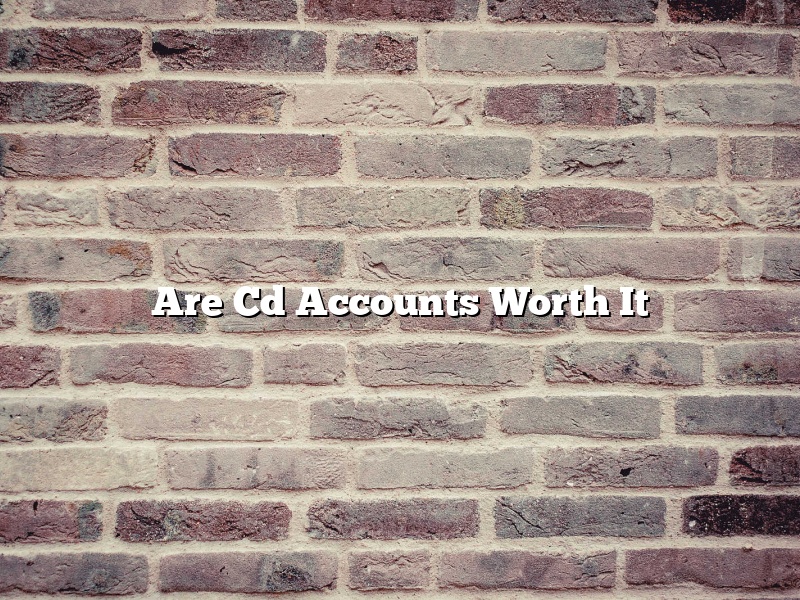Are Cd Accounts Worth It?
Cd accounts, or certificate of deposit accounts, are a type of savings account that offer a relatively high interest rate in return for locking your money in for a fixed period of time. They can be a great way to save money for a specific goal, like a down payment on a house or a new car.
However, before you open a cd account, it’s important to weigh the pros and cons and decide if it’s the right choice for you. Here are some things to consider:
1. The interest rate on a cd account is usually much higher than on a regular savings account. This can be a great way to earn more money on your savings.
2. However, the interest rate is locked in when you open the account, and it usually doesn’t change even if the market interest rates go up. So if you think interest rates are going to go up in the near future, a cd account might not be the best choice for you.
3. You can’t withdraw your money from a cd account before the end of the term without paying a penalty. So if you need access to your money before the term is up, a cd account might not be the best choice for you.
4. Cd accounts are a great way to save for a specific goal. They offer a fixed interest rate and you can’t withdraw your money without paying a penalty, so you know exactly how much money you’ll have when the account matures.
5. Cd accounts are a good choice for people who are risk averse and don’t want to worry about their money losing value.
So, are cd accounts worth it? It depends on your individual circumstances. If you’re looking for a way to save money with a high interest rate, a cd account might be a good choice for you. But if you think interest rates are going to go up in the near future, you might want to choose a different type of account.
Contents [hide]
Is it worth putting your money in a CD?
A CD, or certificate of deposit, is a type of savings account that offers a fixed interest rate for a set amount of time. It’s a low-risk investment option that can be a good place to park your money if you’re looking for a guaranteed return on your investment.
There are a few things to consider before you decide if a CD is right for you. First, you’ll want to make sure you’re comfortable with the length of the investment. Most CDs have terms of six months, one year, two years, or five years. If you need to access your money before the CD matures, you may have to pay a penalty.
Second, you’ll want to make sure you’re getting a competitive interest rate. The interest rate on a CD can vary depending on the bank, the length of the investment, and the amount you invest.
Finally, you’ll want to make sure you have enough money to meet the minimum deposit requirement. Most banks require a minimum deposit of $500 or $1,000.
If you’re comfortable with the terms and you’re getting a good interest rate, a CD can be a good place to put your money. Just make sure you’re not tying up all your money in one place and you have a plan for what you’ll do if interest rates rise and you need to access your cash.”
Can you lose money on a CD?
Can you lose money on a CD?
A CD, or certificate of deposit, is a type of savings account that offers a higher interest rate than a regular savings account. A CD is a low-risk investment, and it is difficult to lose money on a CD. However, there are a few ways that you can lose money on a CD.
If you withdraw money from a CD before the maturity date, you will incur a penalty. The penalty is typically a set number of months’ worth of interest. So, if you withdraw $1,000 from a CD that has a six-month maturity, you will lose six months’ worth of interest.
If you invest in a CD that is not insured by the FDIC, you may lose some or all of your money if the CD issuer goes bankrupt. The FDIC insures CDs up to $250,000 per depositor, so you are protected up to that amount.
If the interest rates rise significantly, you may be able to earn a higher return by investing in a different type of account. A CD is a good option if you are looking for a low-risk investment, but you should compare the interest rates offered by different banks to make sure you are getting the best deal.
What is the disadvantage of a CD account?
Certificate of deposit (CD) accounts offer a safe and secure way to save money, but they also have some disadvantages.
One disadvantage of CDs is that they typically have a longer maturity date than other types of savings accounts. This means that you may not be able to access your money for a longer period of time.
Another disadvantage of CDs is that they typically offer lower interest rates than other types of savings accounts. This means that you may not earn as much money on your deposited funds.
Is it worth it to put 1000 in a CD?
When it comes to saving money, many people think of putting their money into a bank account. However, there are other options, such as investing money in a certificate of deposit (CD). A CD is a type of savings account that offers a fixed interest rate for a set amount of time. Is it worth it to put 1000 in a CD?
The answer to this question depends on a few factors, such as the interest rate and the length of time you agree to keep the money in the CD. Currently, the average interest rate for a one-year CD is around 0.5%. This means that you would earn $5 in interest for every $1000 you deposit. If you deposit money for a longer period of time, the interest rate will be higher. For example, the average interest rate for a five-year CD is around 2.5%. This means that you would earn $25 in interest for every $1000 you deposit.
Another factor to consider is the minimum deposit required to open a CD. Many banks require a minimum deposit of $1000. If you don’t have this much money to invest, you may want to consider a different type of savings account.
Ultimately, whether or not it is worth it to put 1000 in a CD depends on your individual circumstances. If you are looking for a safe place to invest your money and you are willing to commit to keeping your money in the CD for a set amount of time, then a CD may be a good option for you.
Are CDs a good investment in 2022?
Are CDs a good investment in 2022?
This is a question that is difficult to answer with a definitive yes or no. The reason for this is that there are a number of factors that will affect how good an investment a CD will be in 2022. Some of these factors include the current interest rate environment, the overall economy, and the credit quality of the issuing institution.
Assuming that the interest rate environment is relatively stable and that the overall economy is healthy, a CD would likely be a good investment in 2022. This is because the interest rate on a CD will likely be higher than the rate of inflation, and the principal and interest on a CD are guaranteed by the issuing institution.
However, if the interest rate environment is turbulent or the overall economy is weak, a CD may not be a good investment in 2022. This is because the interest rate on a CD may be lower than the rate of inflation, and the principal and interest on a CD are not guaranteed by the issuing institution.
How much will a CD earn in 5 years?
If you’re looking for a safe and reliable place to park your money, a certificate of deposit (CD) might be a good option. CDs offer relatively high interest rates, and the money you deposit is typically insured by the Federal Deposit Insurance Corporation (FDIC).
But how much can you expect to earn on a CD over a five-year period?
To answer that question, let’s take a look at the average interest rates currently being offered on CDs of different lengths:
1-year CD: 1.27%
2-year CD: 1.53%
3-year CD: 1.78%
4-year CD: 2.01%
5-year CD: 2.27%
As you can see, the longer the CD, the higher the interest rate.
So if you invest in a five-year CD, you can expect to earn an average of 2.27% interest on your money. That may not seem like a lot, but it can add up over time.
For example, if you invest $10,000 in a five-year CD, you’ll earn $227 in interest over the course of the term.
That may not be a fortune, but it’s a guaranteed return on your investment, and it’s better than you’ll get from most other types of savings accounts.
So if you’re looking for a safe and reliable place to park your money, a CD is a good option. Just be sure to shop around for the best interest rates, and remember that the longer the CD, the higher the interest rate you’ll likely receive.
How much does a 10000 CD make in a year?
10000 CDs earn their owners about $1,000 a year. That may not seem like a lot, but it can add up over time. And, if you have a lot of CDs, that income could be significant.
CDs have been around since the early 1980s. They were once a popular way to listen to music, but they have since been replaced by digital downloads and streaming services. Despite this, CDs still have a few advantages over those newer formats. For one, they tend to be more durable than downloads and streaming services. They can also be more affordable, especially if you buy them used.
10000 CDs typically sell for around $0.10 each. That means you would earn about $1,000 a year if you sold them all. Of course, you would have to find buyers for all of them, and it’s not likely that you would get that many sales. But, if you could sell even a fraction of your CDs, you could make a nice supplemental income.
There are a few things to keep in mind if you want to sell your CDs. First, you’ll need to make sure you have the proper equipment to do so. This includes a CD player and a way to record the music. You’ll also need to make sure you have the correct software to convert the music to a digital format.
Second, you’ll need to make sure your CDs are in good condition. They should be free of scratches and other damage. If they’re not, you may need to lower your price or not sell them at all.
Finally, you’ll need to find a place to sell your CDs. There are a few options, including online marketplaces and local music stores. You may also be able to sell them to friends and family members.
Selling your CDs can be a great way to make some extra money. Just make sure you do your research first and take care of your CDs. With a little effort, you can earn some extra cash and keep your music collection alive at the same time.




